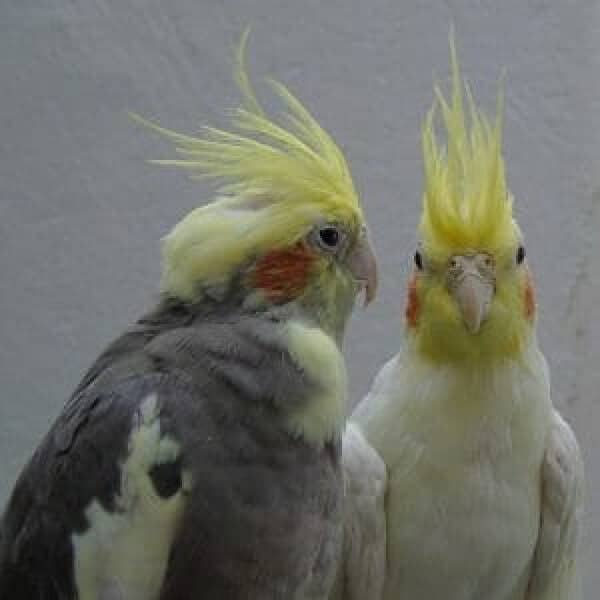Last Updated on by Mitch Rezman
Aloha!
I am truly enjoying your email newsletters. Very informative.
Need some of your advice, I have a Timneh African Gray named “Saber”, now I think about 30 years old. I ended up buying him when he was about 3-4 years old. For several months I would visit the pet shop and always stopped by Sabers cage to play and talk with him.
One day I noticed he was up for sale, and the pet shop owner said that his owner, an elderly lady had passed away, and her family brought the bird to the pet shop for boarding until they decided what to do.
They then called and said they didn’t want the bird anymore. The shop put it up for sale. That’s when I decided to buy him. I was told he was about 3-4 yrs old. He’s always been a sweet cuddly bird, I taught him songs and lots of words.
He would cuddle and sit on my shoulder everywhere I went. I could easily clip his toenails by myself, and clip his wings as needed, and even let me file his beak when too sharp. Never once did he ever bite.
So now Saber is getting in his golden years. Last year he lost vision in his right eye. A cloud-like glaucoma covers his eye. Vet says nothing you can really do for that. He still sees well through his left eye. After he lost his vision, he has become very noisy, he lunges at me like he wants to bite me, he won’t stay on his outside perches.
Roscoe – Timneh African Grey Parrot, Talking
He jumps down and then doesn’t want to come back onto his perch or in his cage. He has bitten me real bad twice this past year. He almost severed the small toe on my right foot. Had to go to emergency for treatment, and he bit me on my hand and left bad scars.
In all the years he never was a mean bird, until last year. Before he would stay outside his cage all day long and play, then just go in at dinner time or when ready to sleep. I am at a loss and don’t know what I can do to make him more comfortable and easier to manage. He still has a few more decades of life in him and want to be able to enjoy him like before. Do you have any suggestions or ideas? I’ve attached a picture of my baby Saber. Looking forward to hearing from you.
Elisa & Saber
Dear Elisa & Saber
Thanks for writing to us. Saber has been through the trauma of losing half his vision. Birds use their eyes to see potential threats; it’s in their instinct. He likely is feeling that he can’t protect himself like he used to. Because you two were so bonded, he may also feel as if his partial blindness prevents him from protecting you, his perceived mate.
Think of losing half your sight and how it might change how you react to life.
Also, his age may be a factor. You didn’t mention if he is moodier during spring or during his molts, but those can be times that any mature bird can feel grumpy.
In most cases, a bird will give a warning or sign before biting. You should study his body language and learn his warning sign to avoid any more serious bites.
At times a bonded bird will bite to warn of perceived danger such as a loud noise; however, this usually appears much earlier in life. The blindness may make him much more aware of things he doesn’t understand and therefore considers danger.
I can’t speak to whether there has been any research done on one-eyed birds. We do know that birds can see the ultraviolet part of the spectrum but humans cannot. Your bird might have lost part or all of his abilities, and the world looks much different.
Losing an eye be it a mammal or an avian species seriously reduces our ability to judge distance. Birds, the only animals of flight rely on the most minute measurements of distance – all you have to do is watch a bird land on a small perch breaking from 15 miles an hour to 20 in a millisecond.
Your African grey has lost that ability meaning it does not know the distance of anything in front of it thus anything in front of its good eye can be frightening and a threat.
We also need to address the issue of the pineal gland that is attached to the eye. The pineal gland takes light information and translates it into “feel good” information – the quality and the amount of light.
Speaking about the amount of light we don’t know if the loss of sight has broken down the circadian clocks in the bird’s instinct. Parrots have the ability to know precisely what time it is and noticed seasonal changes in the lighting as long as their circadian clocks are working properly – but we don’t know that they are.
Moving forward I’m going to suggest three things you can introduce to Saber’s life.
It’s never a bad time to start clicker training – view this video and you’ll see what I mean.
Building Trust With Your Bird ~ Video
It will help Saber focus.
Use millet sprays – keep them around all the time. There is not a bird I know that doesn’t like millet. Serving it on the spray puts 6 inches between her beak and your hand.
We’ve always advocated “stick” training your bird. Having a random perch or a broom handle that your bird can step up on puts distance between the beak and the hand making for a less adversarial relationship.
I hope some of that helps please keep us in the loop and let us know about her progress
Second topic and answer
I guess I answered the wrong address. I have been sprouting micro stuff from China Prairie company in Ca. Anyway, my Quaker doesn’t even bother with the healthy parts just the seeds, and of course, I give him pellets during the day (not that he eats them !) also he’s very picky, and even when I cut veggies up tiny he hardly eats them unless handfed. So should I continue sprouting and do u have an organic micro-grain mix? At least my Kiwi likes nuts and fruit! ( cut up Tony’s) Would feel guilty only giving seeds although I know he likes them.
Thanks, Sandy & Barry Fiedler
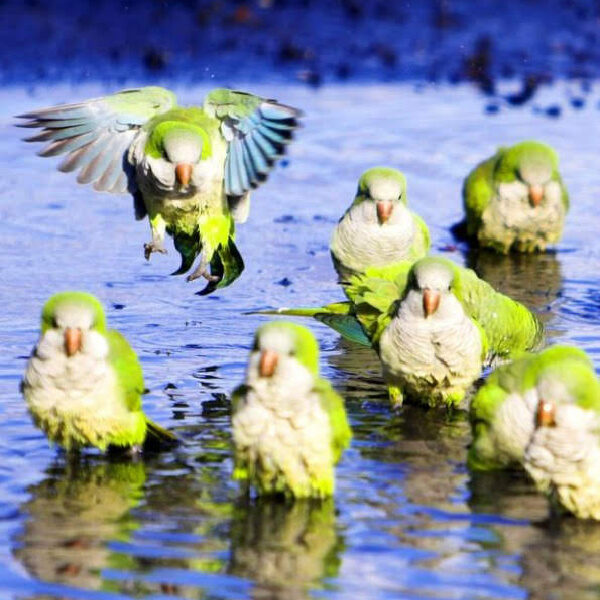
Dear Sandy & Barry
If your bird is not eating the sprouts and never has then put yourself out of your misery and stop sprouting. Not all birds care for sprouts.
If you do want a sprouting mix, these can be used. Higgins Soak & Sprout or Totally Organics TOPS Soak or Dry seed mix
If you are trying to get your Quaker to eat fresh veggies and fruits then they need to have a dish put in its cage EVERY DAY. They may ignore it for a month but if you don’t do it daily, the bird may never bother.
To make it very easy, just get a bag of frozen mixed vegetables from the grocery store. Pour into a plastic container in your freezer, and put it in the door of the freezer for ease of use.
EVERY DAY, pour a tablespoon or so of the veggies into a dish. No need to heat them, let them thaw at room temp; they will last longer.
ADD, a small slice of apple, maybe a grape cut in half, a small slice of banana or something. (NO citrus)
Put the dish in your bird’s cage and leave it until before birdie bedtime and remove it. At some point, the bird will give it a try.
Soft mashed cooked beans, mashed cooked carrots, scrambled eggs, a bit of whole grain bread, a crunchy leaf of romaine lettuce, oatmeal, a few noodles, all are good to help start your bird into eating a more varied diet. (If using perishable foods like eggs or meat, only leave for an hour or so, then remove)
Yes, you will be tossing it all out at the end of the day, but when the bird starts trying something you will cry victory.
What Kinds of Fresh & Prepared Foods Do Parrots Eat? : Exotic Pets
Also, because birds are very social creatures, try letting the bird see you eating some of these foods (or at least making a believable show of pretending to eat) and make a BIG deal about how great they are, with lots of drama, smiles, yums, and other emotional show of enjoyment.
This often raises a bird’s curiosity to want to find out what’s so great. If the bird eats from your hand, then offer the same good item to him and see if he will try it. This sometimes works wonders.
Thank you – Catherine Tobsing
Approved by Mitch Rezman
Author Profile

Latest entries
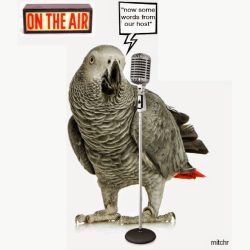 Bird & Parrot CareJune 20, 2025Understanding the Best Way to Use Prevue Pets Mimic Me Voice Trainer
Bird & Parrot CareJune 20, 2025Understanding the Best Way to Use Prevue Pets Mimic Me Voice Trainer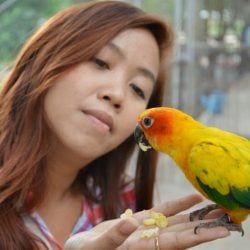 Bird BehaviorJune 6, 2025How Do I Keep My Parrot From Dumping His Food Every Day?
Bird BehaviorJune 6, 2025How Do I Keep My Parrot From Dumping His Food Every Day?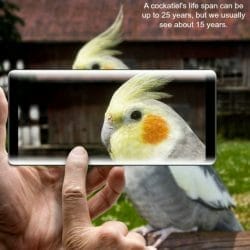 Birds & LightingMay 16, 2025I Am Seeking Clarity About Lighting for My Birds Cage
Birds & LightingMay 16, 2025I Am Seeking Clarity About Lighting for My Birds Cage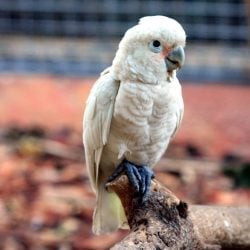 Bird RescueApril 29, 2025How Do We Re-Home a 17 yr Goffin Cockatoo?
Bird RescueApril 29, 2025How Do We Re-Home a 17 yr Goffin Cockatoo?



